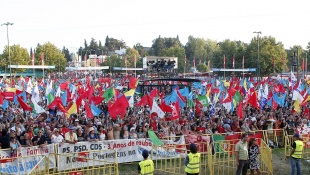The electoral results in the most recent Greek legislative elections were marked by the electoral gains of the Greek Communist Party (an additional 150,000 votes, increasing from 5.9% to 8.2% of the vote, and from 12 to 22 seats in parliament) and by the erosion of the electoral base of the two major parties, the «New Democracy» Party (traditional right-wing), which regained the government, and the PASOK (social-democrat), which had its worst result since 1977.
These election suggest a reflection that goes well beyond the exhaustive interpretation of the results. Not because, in our opinion, the electoral results can be seen as the only or most important element in order to evaluate the correctness of political and ideological lines of intervention and organization. This evaluation – mostly when we speak of communist or progressive parties – relies essentially on the analysis of the social influence and the connection to the working and popular masses; the degree of organization of workers and populations; of the assertion and penetration of the communist project and ideal; and, the degree of organic strengthening of the Parties. For this reason, we look upon the results of the Greek Communist Party as a consequence, not of a good electoral campaign or a particular conjecture, but of the systematic effort of strengthening and building, particularly since 1991, a strong Communist Party. They are the electoral expression of the process of increasing connection to the masses and social influence. And, moreover, of a growing capacity and determination in political intervention in the battle of ideas and for the construction of a anti-imperialist, anti-monopolist popular front in Greece.
Beyond these essentials, it is still important to mention that the electoral results do reflect trends in the sphere of social, political and ideological struggle. The Greek results are evidence of a growing discredit of the two parties of a single political system, intimately connected and committed to the present process of capitalist integration in Europe and aligned with the US and NATO imperialism. That is a reality today, in Greece and other countries in Europe, as well as the complete failure of the illusion that social-democracy – in government or opposition – can represent any sort of alternative to neoliberalism, even if masqueraded at times with cooperation with the so-called "trustworthy" left.
Fighting against a political morass conducive towards conformity and ideological confusion, and facing defamatory campaigns and the attempt of political isolation, the Communist Party of Greece has managed to capitalize on the discontentment, channelling it towards a significant flow of social struggles that struck through Greek society over the last few years. Moreover, these electoral results indicate an increasing political consciousness of the greek workers and people that a political alternative depends, firstly, on the reinforcement of the communist positions. It is important to note that it was among the private sector workers, the unemployed, the small farmers and, most importantly, the youth – sectors involved in recent important processes of struggle – that the Communist Party of Greece strengthened its electoral support.
The Greek results are, for all these reasons, good news and a sign of confidence. An important contribution to the reinforcement of the communist movement, its ideals and project.
